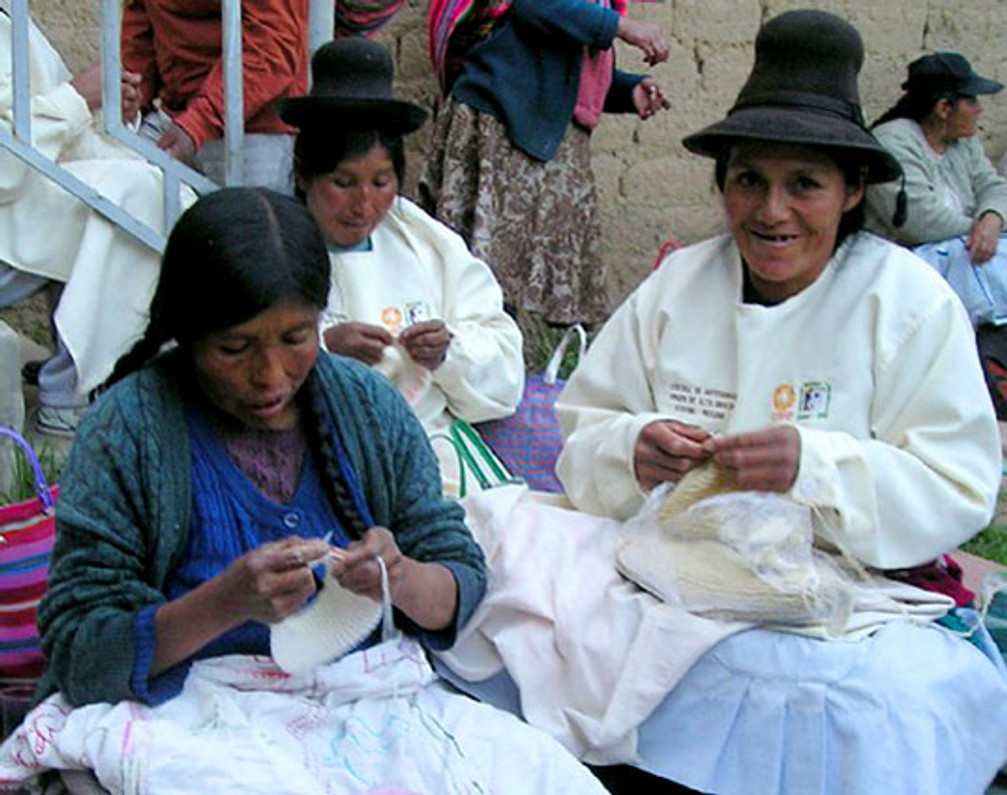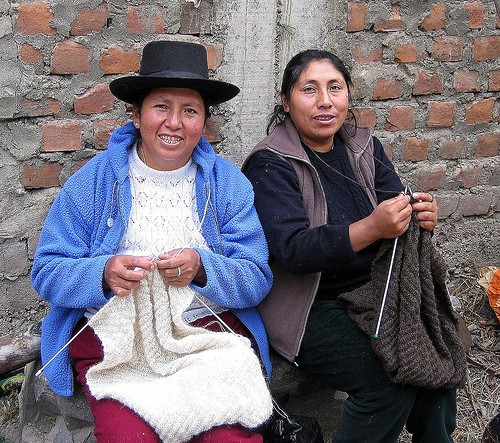Sanyork Fair Trade and Peruvian Fair Trade Working Hand on Hand to Provide Sustainability to Hundreds of Artisans
Artisanal craftsmanship is intertwined within the fabric of Peru, with the tradition of weaving stretching back 5,000 years, from the coastal cities of Paracas and Nazca, to the high Andean peaks of Cusco and Ayacucho.
This rich heritage will not protect itself, however, as it is vulnerable, as every consumer industry is, to losing a demand and thus not being able to support the supply.
The first point to tackle this issue, of generating popularity amongst a largely unknown source of fashion in western terms, is to simply provide a shop window, or marketplace. This is where some truly inspiring companies have stepped in and given hope to what once was a dwindling source of employment.
Social enterprises that connect the world to handmade treasures of the Andes, helping to strengthen ancient craft techniques and empower artisans are revitalising these cultural traditions by creating sustainable markets for them.
Sanyork was formed in 1997. We seeked skilled artisans in Peru to promote the weavings made by the women in the rural communities of the Peruvian Andes. Our first artisan was Daniel Cateno, a teen-age shoe shiner from the streets of Lima. He shone my shoes and as we stroke a conversation he revealed he was really a weaver out of work and had to work the streets of Lima to make a living shining shoes. His passion and skill was weaving since he was a child. This collaboration started in 1998 as we set a small workshop in an old factory in one of dustiest suburbs of Lima. Our project was born and recruited many weaver artisans, painters, potters, knitters, jewelers, seamstresses, furriers, carvers, leathersmiths and woodworkers. It became successful and so inspiring that artisans moved in to the workshop and helped build the different workrooms and got very involved in the Peruvian Fair Trade project. Six months later Peruvian Fair Trade was legally registered as a Peruvian Corporation and filed its first tax return..
Since it was formed, we have continuously evolved, helping the weavers and all artisans involved hone their skills, increasing our capacity in order to provide greater economic support to the communities, and improving our online presence so as to reach a wider audience. One way that we empower the artisans that we work with is through economic investment. Between 2001 and 2010, our investment in Sanyork Fair Trade increased almost 1,000%, and the number of pieces produced per year also increased 500%. In 2001 we created Sanyork Fair Trade, a corporation in the United States that distributes, promotes and markets all the production from our workshop along with a similar textile cooperative in Mexico and a woman’s jewelry co-op in Guatemala
Currently,
- income from Sanyork Fair Trade represents a 50% increase in the artisans annual income
- 72 families are supported through Sanyork Fair Trade
- 67 children of school age or younger are supported by our project
The artisans invest any increase in income in their children’s well-being: in better nutrition, education, and living conditions. In addition to financial support, the skills the weavers develop as a result of working leaves them equipped to find and take on new opportunities of their own. We’ve seen this in action as artisans tell us about traveling to various trade fairs, workshops or other events that they have been invited to or which they have sought out themselves.
We have also entered some of our artisans’ work in local crafts competitions. In 2011, Pablo Laura, one of the weavers from Junin, won first place in a local competition. He was so excited, he was awarded a participation in an International Fair in Barcelona Spain where he was invited to teach weaving. He remains in Spain until now and has become internationally renowned. He received this award, and told us that it was thanks to all he’d learned over the years of working with us that enabled him to win. We could not have been more proud!
Our mission remains committed to promote the revitalization of ancient artisan traditions, including challenging techniques, even while we work with designers to create modern, fashionable and marketable products.
I’m especially excited about our current production because of is an example of different traditional techniques all highlighted.
Education is a key part of what we do, in order for people to understand and appreciate the work that goes into making the products we sell, and the richness of their cultural value. We do this through labels, social media and the blogs in our website. It’s hard to know how well we are reaching people, but it does seem to me like there is increasing awareness about handmade and artisanal products.
Education also goes both ways. We look for ways to expose the artisans we work with to new ideas in order to spark creativity and inspiration. Sometimes that’s just an exchange with other fellow artisans at events and fairs and learn about what they are doing. Gathering artisans allows them to participate in exchanges of ideas and experiences. At the end we want them to feel pride and dignity about their work.
Our difficulties have almost always to do with lack of resources, both manpower and financially. It’s a bit of a vicious cycle as fewer resources mean difficulty in sponsoring and occupying more people, but fewer people mean not being able to spend as much time as we’d like on growth that could help us supply bigger orders and larger clients, not to mention other long-dreamed about projects.
We are a for profit organization that operates with a vision of empowering artisans to make a living wage and have a sustainable occupation doing what they know with pride and dignity. We engage in business activities that promote their work and allow us to have a stream of income that trickles to every person involved making it easier for each person to have a decent paying job and our businesses to operate with a social purpose – instead of a purely profit-generating purpose – going a long way to dealing with the issues the world faces. People who are motivated to use their time for the benefit of people and the planet, should be able to do so and still earn a decent living wage. There shouldn’t need to be a duality between for- and non-profit structures in order to do socially beneficial work.
We hope that traditional folk arts are recognized as a sustainable cottage industry and viewed as a good career choice for young people. To achieve that, we need to reach a volume of sales that will provide more, and more consistent, work for the artisans regardless of their area of expertise, so a lot of our future plans are geared towards increasing sales. Over and over the past years, the artisans have been commenting how grateful they are for the orders. As we progress as an organization we want the challenge of higher volume of work and bring in new products that are fit for the global market. In addition to increasing our sales and production, I would also like to see us complete a number of projects, from building top quality products at a consumer value price, to bringing more technology to the crafters and training them to use it for their work..
The women’s program is one that benefits women raising their families on their own. In a country without a welfare system and social programs to benefit the most in need we have implemented workshops that allow these generally abused women to raise their children without the abuse or financial dependency from alcoholic or machista partners.
The workshops allow these women to share the work and a place to feed and raise their children safely. Common shared kitchens, shared child care, group work well paid by the piece and a safe and secure work environment adequate for children. Classes to allow them to improve their artisans skills and family therapy to overcome trauma from continuous physical and mental abuse.
Team work has been the key for them, cooperation to complete large orders and sharing multiple tasks that allows them to complete their work sharing their income equally. Participation has grown from five to over 30 women in recent months.
Knitting finger puppets, embroidery, applique work on fabric, making woven friendship bracelets and earrings are skills that theses mothers are able to do and have mastered over time and do with a passion.
Peruvian fair Trade has always been about the artisans. They are the heart, talent, and inspiration behind our project. Watching the artisans learn and grow together is a really special experience for me as director of operations. All the little steps - trying out new products, making errors, learning what sells and what doesn't, incorporating new materials and techniques - have really added up to big transformations. When I look back 4 or 5 years ago and see the progress that the artisans have made I’m amazed at their growing talent.
Branding and conveying all the essence of what we are and what we do from a more developed business perspective, with the result being B2B and B2C sanyorkfairtrade.com and an origin business sourcing operation as peruvianfairtrade.com developing brands and logos for specific categories to convey our vision. It’s particularly meaningful for the artisans to develop category brands to recognize each specific individual group involved and create something new along with the help of the artisans’ creative skills. This is part of becoming more sustainable, environmentally and economically which are important to us.
We want to be sure that artisans are receiving enough economic support to where they feel comfortable and confident enough in their financial progress to support their families and other endeavors/goals in their personal lives.Growing and scaling a business is something we’re taking one day at a time and we want to ensure it’s done with the right intent for the artisans and brand.
We want the artisans to think of Peruvian Fair Trade not just as a job, but an opportunity to pursue whatever goals they have in their professional and personal lives. If there is a way to make resources available to them (new skills, financial stability, entrepreneurship opportunities, etc.) to achieve something they otherwise thought wasn’t possible, then I think Peruvian Fair Trade and Sanyork Fair Trade combined have accomplished an incredible goal. We are and always have been rooted in a desire for artisan women to pursue their dreams and learn from one another--whether an artisan, intern, designer, or manager--and this constant symbiotic relationship I think will continue to drive our success.
We hope you continue to follow us on and offline. It’s been amazing to see not only this project grow, but all of us, artisans men and women, our hard working staff evolve into better versions of ourselves, myself included. Building this type of community among us has been something I have cherished. I now view community as something so powerful for artisans anywhere. I’m grateful to have the chance to work with such talented and inspiring human beings.
Recent Posts
-
Why Handwoven Bags Are More Than Just Accessories
In a fast-moving fashion world, trends come and go—but handwoven bags remain timeless. They’re not j …28th Dec 2025 -
Empowering Artisans Communities and Promoting Traditions to Inspire Consumers with our Mission
This letter comes from Kathryn at Yaya’s, one of the many cherished customers who have supported us …28th Dec 2025 -
Why Alpaca Blankets Should Be a Retail Priority This New Year
January is historically a strong retail month for comfort-focused goods. Consumers are seeking warmt …2nd Dec 2025



